
|

|
 | |
|
An up close and personal interview with U.S. Navy Veteran and Togetherweserved.com Member:
CAPT William Pappas U.S. Navy (Ret) (1968-2006)
WHAT INFLUENCED YOUR DECISION TO JOIN THE MILITARY?
In 1968, the draft was looming, the reports on TV were that draftees' deaths were continuing to rise, and the public was against everything military, including the "baby killers" who were sent to Vietnam under orders of our Commander in Chief, President Lyndon Johnson. So rather than wait for my  draft lottery number to be called, immediately after graduating from high school, I enlisted in the Navy at MEPS (Military Entrance Processing Station) in Newark, NJ. After swearing in, I was off to Great Lakes, Illinois for recruit training. draft lottery number to be called, immediately after graduating from high school, I enlisted in the Navy at MEPS (Military Entrance Processing Station) in Newark, NJ. After swearing in, I was off to Great Lakes, Illinois for recruit training.
It was a continuous lesson in disciplines -- self discipline as well as team discipline. From the time I got off the bus and began "in processing," everything I thought I knew only served to get in the way. There were lots of new things I needed to learn to do it the NAVY WAY. And learn them I would or else. Once I was issued my military gear, I was given a cardboard box and told to immediately mail home my personal belongings. In essence, I was told what to do and when to do it. Life as I formerly knew it was over.
From the first day I was awakened (reveille) to the time I was ordered to put out the lights (taps), I was provided the basic and ONLY expected way to conduct myself. There was no individualism or variants of the RIGHT way to do things. My hair cuts took less than one minute. Had I known this, I could have saved a few bucks by NOT going to my hometown barbershop and paying for a crew-cut a few days before I enlisted. Food served was to be eaten -- albeit good, bad or ugly. I got my physical/dental exam, and all immunizations at once. I learned how to march, turn and double time; how to wash; how to improvise; how to clean places I never even touched before -- with little more than a toothbrush -- MY toothbrush. I learned how to hand-wash, dry, fold and properly stow my government issued clothing (including underwear) to meet inspection standards. I was issued a training rifle (a piece) and taught how to hold, handle, and drill with it. If I failed to take proper care of my piece, I knew I'd end up sleeping with it too. Well, that is after I was given some special, after-hours, extra military instruction (EMI), affectionately called "happy hour."
Similar to the weight of a sea bag which always seemed lighter the first few minutes it was carried, that's when I learned a piece could get exponentially heavier when holding it straight out in front of you in a squatting position. Believe me; no one wanted to get enough demerits to learn how to drill with the U.S. Marines at happy hour.
From day one, I was trained to fight -- fighting incredible fires, gas or chemical -- even how to survive a nuclear attack. Having never shot more than an air rifle and a BB gun at a state fair shooting gallery, I quickly learned how to accurately fire hand weapons, rifles, and everything else in preparation to repel unauthorized boarders on our ship; save shipmates' and perhaps my own life. If you joined the Navy and were overweight, you left boot camp at least 10-20 pounds lighter and fitter. If you came in thin and limp, you left 10-15 pounds fitter -- not fatter. I learned to honor, trust and blindly obey those placed in charge of my training/leading me. When told to jump, the only question I dared ask was, "how high?" Above all, I learned that as one individual, I would only be as strong as the combined strength of everyone in my unit. There was no room for a shipmate to fall behind. If he did, you feared you would all be left behind. To win meant everyone winning. And it was everyone's job to help those who could not help themselves. I quickly learned how to accurately fire hand weapons, rifles, and everything else in preparation to repel unauthorized boarders on our ship; save shipmates' and perhaps my own life. If you joined the Navy and were overweight, you left boot camp at least 10-20 pounds lighter and fitter. If you came in thin and limp, you left 10-15 pounds fitter -- not fatter. I learned to honor, trust and blindly obey those placed in charge of my training/leading me. When told to jump, the only question I dared ask was, "how high?" Above all, I learned that as one individual, I would only be as strong as the combined strength of everyone in my unit. There was no room for a shipmate to fall behind. If he did, you feared you would all be left behind. To win meant everyone winning. And it was everyone's job to help those who could not help themselves.
Needless to say, I enjoyed the overall boot camp experience -- especially those early "life lessons" I was taught. At the time I didn't know it, but those lessons would be the foundation of my maturity in the Navy. But still, there were some who did not or could not make the adjustments -- those who could not check their egos at the door, suppress their inner child, grow up, or adjust to the exacting regimen. For those who couldn't hack it, they found themselves either pushed back weeks in training or administratively discharged. Sadly, one recruit found the adjustments so difficult, he took his own life during our training.
I have to admit, from my rather wild past and impetuous demeanor, I had a few personal adjustments of my own to make in order to fit in. Had I tried to dig in and be that street kid who had enlisted only a few weeks earlier, I would have not passed muster -- and certainly would not have graduated with my company. The vast majority of us learned the team concept quickly and we were in synch despite our colorful backgrounds, upbringing, and beliefs. In fact we all did so well; our Company #578 was awarded the honor of graduating as the "color company" -- the best unit in most every area of training, sportsmanship and discipline. Although it was certainly no 'piece of cake,' in the end we all acted, looked, and thought as one. It was a humbling, motivating and exciting experience.
 After all we went through together, it seemed a shame we had orders to different ships, stations and squadrons. However, closely bonding with my shipmates, and eventually leaving them as lifelong friends, I would learn to be something continually repeated over and over again during one's military career. Although apart in distance and time; there are many with whom I served who will never be lost from my heart and mind. After all we went through together, it seemed a shame we had orders to different ships, stations and squadrons. However, closely bonding with my shipmates, and eventually leaving them as lifelong friends, I would learn to be something continually repeated over and over again during one's military career. Although apart in distance and time; there are many with whom I served who will never be lost from my heart and mind.
So, after about eight-nine weeks of getting re-educated and a little Rest and Relaxation (R&R) leave at home, I was off to my first ship, the USS ISLE ROYALE (AD 29), home ported in Long Beach, California. At this point I was highly motivated and quite anxious to see how my initial positive training experiences would compare to my first official assignment aboard a Navy warship. Yes, I would soon be a salty Sailor; 'haze gray and underway...'
WHAT WAS YOUR SERVICE CAREER PATH?
After an all too quick period of leave back home in New Jersey after recruit training, I was flying for the second time in my life -- this time to Los Angeles Airport to go to Long Beach, California to report aboard my first ship, the USS ISLE ROYALE (AD  29). Back then there were no ship sponsors or military welcoming kiosks waiting at the airport, so I quickly learned how to spend a heck of a lot of money on a cab ride to the naval station -- pretty much a cabbie's target in my service dress blues and sea bag in tow. 29). Back then there were no ship sponsors or military welcoming kiosks waiting at the airport, so I quickly learned how to spend a heck of a lot of money on a cab ride to the naval station -- pretty much a cabbie's target in my service dress blues and sea bag in tow.
After all the competitive, team successes we achieved at recruit training, my first impression aboard ship was considerably less than I had expected. Like most "newbie's" I was immediately placed in one of two Deck Divisions where my assigned duties were to swab fresh water over perpetually salt-stained decks; polish anything and everything made of brass or chrome; and grind, sand, prime and paint everything one particular shade of gray or another. My "leading seaman," leading petty officer, and the surly Chief Boatswain's Mate told me that this would be my job from 4:30 AM to 5:30 PM, every day, M-S for at least the next six months. "It's the way things are, and always have been, and will be," I was informed. But wait a minute! They must have made some mistake, I thought. I was to be a sonar or electronics technician as promised by my Navy recruiter. Surely it was etched in my enlistment contract that I would be soon going to one of the Navy's electronics service schools in San Diego and then return to a division where I would use this advanced training. Even my Armed Services Vocational Aptitude Battery Study Guide (ASVABs) and boot camp classifier said I was destined to be in electronics. "Ah, but not so fast, -- my ship's personnel specialists told me. There was nothing indicated in my service record guaranteeing me a technical service school or anything else for that matter, except four years of continuous active duty wherever the Navy needed me. So, as you might imagine, the euphoria I once experienced coming out of boot camp was quickly replaced by reality. It was at that point that I quickly learned lesson number one: "Always read before you sign anything -- especially your enlistment contract!"
The truth be known, not being permitted to attend a Navy "A" school or work in the technical area I thought I was going to be assigned didn't turn out so bad. Like so many future twists of fate and rare opportunities I would get, the six-month stint on the deck force in the Second Division would prove to be another one of my best learning experiences.
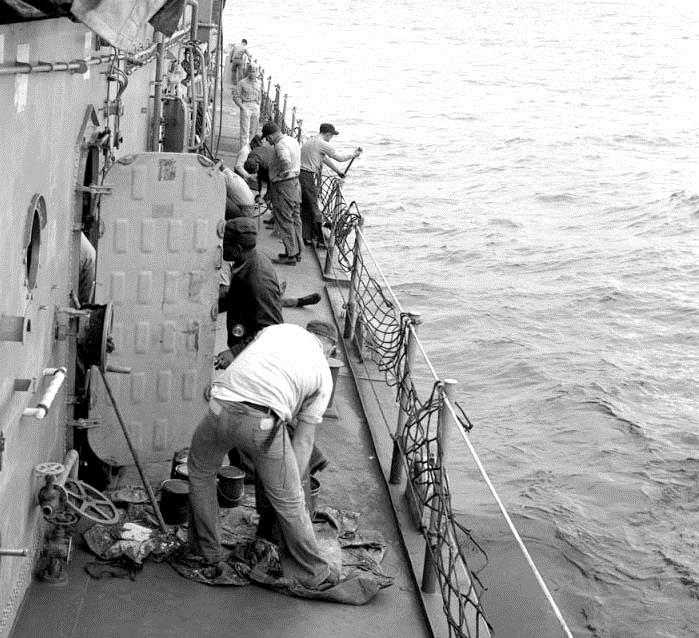 We got underway from Long Beach in January 1969 and navigated our way to Pearl Harbor, Hawaii to perform our primary function of repairing damaged warships or provide the necessary advanced maintenance to those requiring it. The eight-day underway period was in itself, was quite an adventure. Over the many four-hour underway watch assignments, I quickly learned to take the helm (drive) the ship; adjust speeds; look out for navigational hazards; as well as participated in many man-overboard, abandon ship, underway replenishment and other damage control drills. While I didn't know it then, learning some good old marlinspike seamanship, proper rigging, watch standing and preservation techniques were the kinds of things that ingrain the right amount of salt into the blood of a new Sailor; and serve well as a deck plate from which to begin one's seafaring career. We got underway from Long Beach in January 1969 and navigated our way to Pearl Harbor, Hawaii to perform our primary function of repairing damaged warships or provide the necessary advanced maintenance to those requiring it. The eight-day underway period was in itself, was quite an adventure. Over the many four-hour underway watch assignments, I quickly learned to take the helm (drive) the ship; adjust speeds; look out for navigational hazards; as well as participated in many man-overboard, abandon ship, underway replenishment and other damage control drills. While I didn't know it then, learning some good old marlinspike seamanship, proper rigging, watch standing and preservation techniques were the kinds of things that ingrain the right amount of salt into the blood of a new Sailor; and serve well as a deck plate from which to begin one's seafaring career.
It wasn't a full six months of chipping paint before I began searching for a job or skills for which I would be best suited. Since my father was always involved in electronics (radio and television repair) back home, I felt obliged to follow in his footsteps. After all, once I had the right training and separated from the Navy, in only a few years I'd join him in achievement of his goal to open up his own 'father and son' Radio and TV repair shop in our neighborhood. But as fate would have it, the folks in my ship's personnel office who first advised me that I was not guaranteed to attend an electronics "A" school, told me they were looking for help in that office, and offered me an opportunity to "strike" for advancement in the Personnel man (PN) rating.
At first I was assigned duties in the educational services area of the personnel field. I was handed a Navy Advancement manual and told to read it as it would be my bible. I was told I would need to carefully analyze data from over 300 candidates' service records and to transfer this official record data to their examination worksheets -- and do so in one week's time. The accuracy of my work would ensure fully eligible/promotable Sailors could compete for advancement. Any mistakes could cost a Sailor a well-earned promotion. Gee, nothing like a little pressure to get you motivated! After that first Navy-wide examination cycle was complete, I was told I did rather well for someone without any prior formal training or personnel experience. I thought, "Gee, maybe this is my niche in the Navy? I was working in an office, given important responsibilities, helping people. What's not to like?" It was here that I got my education in lesson number two: "Good things come to those who seek them out."
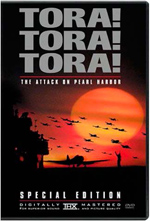 What's more, during this 6-month deployment to Pearl Harbor, Hawaii I even got to experience a taste of Hollywood! You see, there was a production company looking for "extras" in the filming of the 20th Century Fox war film, "Tora! Tora! Tora!" Being selected as a movie extra was quite an experience, and one I will always remember as a highlight of my first ship tour. While this is a 'sea story' in itself, suffice it to say I was left thinking, "Wow, all this and they pay me too? It just doesn't get any better!" Or does it? At 19 years old and now working 'normal' hours, I also got the extra time off to cruise the eye-popping, bikini-laced beaches of Waikiki! Clearly those delightful 'liberty' distractions would do much to counterbalance any real thoughts giving up this kind of life, right? What's more, during this 6-month deployment to Pearl Harbor, Hawaii I even got to experience a taste of Hollywood! You see, there was a production company looking for "extras" in the filming of the 20th Century Fox war film, "Tora! Tora! Tora!" Being selected as a movie extra was quite an experience, and one I will always remember as a highlight of my first ship tour. While this is a 'sea story' in itself, suffice it to say I was left thinking, "Wow, all this and they pay me too? It just doesn't get any better!" Or does it? At 19 years old and now working 'normal' hours, I also got the extra time off to cruise the eye-popping, bikini-laced beaches of Waikiki! Clearly those delightful 'liberty' distractions would do much to counterbalance any real thoughts giving up this kind of life, right?
Although being a Sailor a tad over eighteen months and having only limited experience in the PN rating, I was ecstatic to learn I had passed the PN advancement exam with a score sufficient enough to be designated as an official "striker." That meant although I wasn't paid any more than before, I was no longer an ordinary seaman. It was just before the Christmas in 1969 that we returned to our home port of Long Beach, California. And now that I was in the Personnel Office, I have to admit it was nice having to neither stand all those underway watches I stood on the voyage to Hawaii, nor the in port deck duties I had previously done. Navy life aboard the tender was good!
Even though I certainly enjoyed the trust, respect and growing responsibilities doing office work, I felt that I needed something more to be fulfilled. Surely there was something missing? I wanted to see the world 'find adventure' just like the Navy poster advertised! There must be greater challenges and more exciting opportunities than working in an office, on a seldom-sailing, destroyer tender, repairing warships? Maybe I should request a transfer? Hmm ... decisions, decisions.
After a short shore leave back to my hometown in New Jersey, I flew back to my ship just in time to learn lesson number three: "Be careful what you ask for -- you just may get it." Little did I know it at the time, but greater challenges, thrills and excitement were just on the horizon. "Join the Navy and see the world." I surely would.
DID YOU PARTICIPATE IN COMBAT OPERATIONS? IF SO, COULD YOU DESCRIBE THOSE WHICH WERE SIGNIFICANT TO YOU?
While I was assigned aboard the USS John Paul Jones, we provided Navy Gun Fire Support (NGFS) along the Vietnam coastline. This assignment required us to carefully maneuver through enemy waters very close to the shoreline in order to fire our gun batteries precisely (and deep) into targeted enemy positions 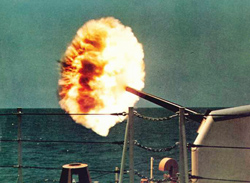 in support our brothers on the ground. This we did with great accuracy (and much enthusiasm, I might add). in support our brothers on the ground. This we did with great accuracy (and much enthusiasm, I might add).
But under the heading of "not everything goes as planned" on our fourth day of NGFS whereby we continuously lobbed 5" shells into enemy positions, our ship suddenly shuddered, lost power, and came to an eerie STOP! There we were, dead in the water! We were so close to the coast you could see the enemy scurrying along the shoreline. What caused this unbelievable situation, we all wondered? We came to learn that our propeller and rudder became entangled by huge, Vietnamese fishing nets. Unable to move, we had little time to waste -- we were sitting ducks. Fortunately, a couple of Sailors with diving skills quickly volunteered to go over the side and cut away the nets. After what seemed like an eternity; within a few hours we were cleared of the nets, ship's power was restored, and we were back on our primary NGFS mission. Believe me; that firing line experience on the deployment was as close to being in harm's way as any of us cared to admit.
WHICH, OF THE VESSELS OR DUTY STATIONS YOU WERE ASSIGNED TO, DO YOU HAVE THE FONDEST MEMORIES OF AND WHY?
Every assignment, every tour had its highs and its lows. It's what made my career so long and memorable. To pick out a couple that stand out among the most memorable I'd have to start off with my first shore tour at Attack Squadron FORTY TWO in Oceana, Virginia. It  was there that I honed my leadership skills learned from my most influential mentor, Senior Chief Personnel man Tom James. It was there I first reenlisted. It was there I was first selected as Sailor of the month and two consecutive years as the squadron Sailor of the Year. It was there I advanced from third class to a first class petty officer. was there that I honed my leadership skills learned from my most influential mentor, Senior Chief Personnel man Tom James. It was there I first reenlisted. It was there I was first selected as Sailor of the month and two consecutive years as the squadron Sailor of the Year. It was there I advanced from third class to a first class petty officer.
After VA-42, I'd have to say being selected to Chief Petty Officer aboard the USS SIMON LAKE (AS-33) was the next most positively memorable event in my Navy life. Joining my brothers in the CPO mess was about as close as one can get to being with family. The experience and leadership skills you acquire as a Chief are important, key cornerstones to having a successful career. It is there you learn from the best to become one of the best.
Of course, being selected for a commission at Naval Air Station Brunswick, Maine; my Officer in Charge tour at Naval Air Station Lemoore, California; and three successive tours in beautiful Pearl Harbor, Hawaii all bring back some very fond memories for both me and my family in the 80's. But the most fulfilling tours I had in the latter part of my career were my Admin department head tour aboard USS ABRAHAM LINCOLN (CVN 72) and Personnel Support Activity Jacksonville commanding officer. Both of these exciting tours proved to be a culmination of the leadership skills and experience that not only made my career so accomplished, but I'm sure made the careers of those I worked with equally as rewarding.
FROM YOUR ENTIRE SERVICE CAREER WHAT PARTICULAR MEMORY STANDS OUT?
I would have to say my unexpected, short fused PCS assignment from my first ship to my second ship held the record for being the most unique (eye opening) experience and adventure in my career. In January 1970, emergent transfer orders came in directing one of our personnel office 'front-runners" 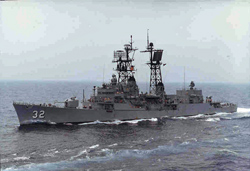 to report to a guided missile destroyer -- a warship imminently deploying to support our maritime war effort in Vietnam. After what must have been a short deliberation (in which I played no part) I returned from Christmas leave to be told my name was being substituted for the Sailor who was originally issued the PCS orders. The old CWO Ship's Clerk said, "Pack your sea bag son; you're reporting to the USS JOHN PAUL JONES (DDG 32) not later than midnight tomorrow." to report to a guided missile destroyer -- a warship imminently deploying to support our maritime war effort in Vietnam. After what must have been a short deliberation (in which I played no part) I returned from Christmas leave to be told my name was being substituted for the Sailor who was originally issued the PCS orders. The old CWO Ship's Clerk said, "Pack your sea bag son; you're reporting to the USS JOHN PAUL JONES (DDG 32) not later than midnight tomorrow."
I quickly learned that when you report into a new command, regardless of any credibility or respect one with some tenure normally acquires in the corporate world, in the Navy you basically start from the bottom again. That is of course with the exception of the bunk (rack) to which you are assigned. Remarkably, that normally turns out to be the top one -- the top rack -- the one that's the hardest to get into at taps and/or roll out of at reveille -- the rack that is usually only a few inches from the overhead duct work and locker tops. You just gotta love it!
In general, the personnel work was basically the same aboard this smaller ship, as it was on my first ship -- the destroyer tender. The one big exception was that the office was much smaller and we were collocated with the ship's yeomen in the office. On the positive side, this collocation taught me many more facets of my Personnel man rating, the Yeoman rating, and the combined skill sets of both. I would find this collaborative knowledge and experience would be quite helpful later on in my career.
With about a month aboard, we deployed to the Western Pacific (WESTPAC) under the operational control of the Commander 7th Fleet. Our ship's mission was twofold. First and most often, we were assigned plane guard duty (maneuvering astern of our aircraft carriers -- like the USS CONSTELLATION, USS RANGER, USS ORISKANY and BON HOM RICHARD.) As a smaller, more mobile ship we were in that "following" position to readily rescue pilots or Sailors that may have been accidentally ejected or blown overboard by jet exhaust. While this mission was fairly routine during the day, it was particularly arduous at night -- when both accurate visual and radar assisted navigation were paramount.
After a few weeks at sea, we intermittently visited several ports of call in the Far East to take on fresh food and supplies, make minor repairs, and of course take a little time off for the crew's rest and relaxation (R&R). "Join the Navy and see the world!" Well, see the world -- I did! 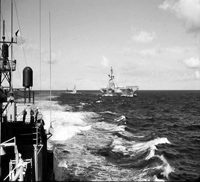 Crossing the equator for the first time and the traditional "Shellback" initiation (flogging) that accompanied said crossing was an interesting experience in itself. Even photos taken didn't do it justice. Along the way we stopped in ports of call like Hawaii, Guam, Pago Pago, the Philippines, Japan, and Taiwan. Towards the end of our deployment, we stopped in Hong Kong, Australia, and New Zealand. Visiting these ports of call and getting to interact with the local people produced some real EYE OPENING experiences I will never forget. While I would love to expound upon my many adventures and discoveries in each one of these liberty ports, regrettably those "sea stories" would take too long to discuss now; and some would most certainly cross the line of not being suitable for all audiences. Suffice it to say, the exotic inhabitants, wonderful dishes and various libations were all most educational to this young Sailor! Crossing the equator for the first time and the traditional "Shellback" initiation (flogging) that accompanied said crossing was an interesting experience in itself. Even photos taken didn't do it justice. Along the way we stopped in ports of call like Hawaii, Guam, Pago Pago, the Philippines, Japan, and Taiwan. Towards the end of our deployment, we stopped in Hong Kong, Australia, and New Zealand. Visiting these ports of call and getting to interact with the local people produced some real EYE OPENING experiences I will never forget. While I would love to expound upon my many adventures and discoveries in each one of these liberty ports, regrettably those "sea stories" would take too long to discuss now; and some would most certainly cross the line of not being suitable for all audiences. Suffice it to say, the exotic inhabitants, wonderful dishes and various libations were all most educational to this young Sailor!
But I digress. When we weren't plane guarding, performing ship's upkeep or enjoying some much needed R&R in some fantastic places, our second significant mission was to provide Navy Gun Fire Support (NGFS) along the Vietnam coastline. Suffice it to say, I left the JOHN PAUL JONES as an "experienced" and seasoned Sailor. I left with fond memories of the shipmates with whom I served, as well as the exciting adventures (at sea and in port) I experienced. Great memories that I still recall with much emotion to this day.
OF THE MEDALS, AWARDS AND QUALIFICATION BADGES OR DEVICES YOU RECEIVED, WHAT IS THE MOST MEANINGFUL TO YOU AND WHY?
Of all the many awards, qualifications, and devices I received, the most meaningful was not actually any one of these 'things.'
Ask anyone who is considered a success in their particular vocation what they consider most important to their good fortune and you'll most likely hear that there was one  or more significant 'people' in their lives who were (and maybe still are) behind them. Mentors, coaches, spouses, parents, clergymen, and even ex-bosses or co-workers are often singled out as critical elements in molding the ordinary into the extraordinary. While one might argue there are some leaders who are natural born, I contend that successful leaders are a composite of the great coaching and mentoring of those considered the best -- as well as those with the kind of faults we are determined to avoid. Great leaders adopt the best from the best; and learn what not to be from the worst. Add that learning experience with good upbringing, values and beliefs and you'll find leaders with a foundation for success --- a foundation that ultimately nurtures the success of others. or more significant 'people' in their lives who were (and maybe still are) behind them. Mentors, coaches, spouses, parents, clergymen, and even ex-bosses or co-workers are often singled out as critical elements in molding the ordinary into the extraordinary. While one might argue there are some leaders who are natural born, I contend that successful leaders are a composite of the great coaching and mentoring of those considered the best -- as well as those with the kind of faults we are determined to avoid. Great leaders adopt the best from the best; and learn what not to be from the worst. Add that learning experience with good upbringing, values and beliefs and you'll find leaders with a foundation for success --- a foundation that ultimately nurtures the success of others.
By the end of my shore tour in 1974, I had served in the Navy a total of 6 years. During my squadron shore tour, under my mentor Senior Chief, I advanced to First Class; and despite being a 'shoe' in an aviation world, my performance evaluations would consecutively rank me as number 1 of all my peers. I would also be selected as the squadron's and Air Wing's Shore Sailor of the Year -- two years in a row. Sure, individual hard work and perseverance played a part. But I attribute the vast majority of these significant career enhancing achievements -- springboards to my long and successful Navy career -- to the senior enlisted leadership I was so fortunate to have had at that particular time.
That leadership guided me to my all-important 'tipping point' and the most meaningful to me.
WHICH INDIVIDUAL PERSON FROM YOUR SERVICE STANDS OUT AS THE ONE WHO HAD THE BIGGEST IMPACT ON YOU AND WHY?
The person who had the single biggest impact on me (and still does to this day) was my Senior Chief Personnel man and mentor, William Thomas James.
As a new Second Class Petty Officer, it was early in 1972 that I met my first life-long mentor -- a seasoned Senior 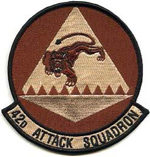 Chief Petty Officer who had just reported to our aircraft squadron after serving a geo-bachelor Recruiter tour in the Chicago, Illinois area. Until that time, I was still the same cocky, independent Sailor who most often played to his own music and "needed little or no supervision to accomplish his duties." (Well, that's what it said in at least one of my early performance evaluations.) I believe it was the trust and respect of my immediate supervisors who granted me the authority to meet the level of my responsibilities -- that boosted my confidence and independence. Maybe a little too much confidence as there was a point early in my career where I let pay grades and military protocol become blurred, consequently causing my unchecked, inflated ego to give me a feeling of bullet-proof invincibility. Note to self: Once in a while you have to check your hat size to make sure it still fits your big old head! Chief Petty Officer who had just reported to our aircraft squadron after serving a geo-bachelor Recruiter tour in the Chicago, Illinois area. Until that time, I was still the same cocky, independent Sailor who most often played to his own music and "needed little or no supervision to accomplish his duties." (Well, that's what it said in at least one of my early performance evaluations.) I believe it was the trust and respect of my immediate supervisors who granted me the authority to meet the level of my responsibilities -- that boosted my confidence and independence. Maybe a little too much confidence as there was a point early in my career where I let pay grades and military protocol become blurred, consequently causing my unchecked, inflated ego to give me a feeling of bullet-proof invincibility. Note to self: Once in a while you have to check your hat size to make sure it still fits your big old head!
But one can only be so bullet-proof. Less than six months after our Senior Chief reported aboard, I got my wake up call. It came as a shock when I returned from a leave period to find another second class petty officer sitting in my chair at my desk. I asked him what was up and he only said. "You need to talk to the Senior." I came to find out I was kind of relieved of my supervisory LPO position (okay, fired as the Educational Services Office (ESO) supervisor). Why? Well, I was told I had failed to ensure the execution of some rather important administrative details before I went on leave. Clearly in a state of disbelief and denial, I thought: these menial things couldn't have possibly been the cause for me to be relieved. They weren't life-threatening or even operationally mission impacting.
But those thoughts were quickly kicked to the curb by my Senior Chief who 'explained' how significant and important they were to the Sailors who awaited the results of their promotions. Keep in mind this happened long before the instantaneous speed of email and the Internet. Back then we did everything by 'snail' mail or sometimes naval messages. Bottom line: I failed to mail out important advancement examination results to Sailors who had been transferred to other commands subsequent to taking their exams.
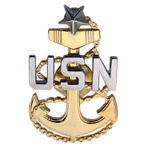 To my Senior Chief and the squadron Personnel Officer, my lack of urgency was not the kind of customer service our Sailors deserved -- and he explained I created unnecessary anxiety for them, and I could have adversely affected their timely promotions -- all because I didn't feel it was important enough. This is where I learned another important lesson: Doing what's right isn't always as important as doing the right thing -- a lesson in customer service and leadership I still carry with me today. To my Senior Chief and the squadron Personnel Officer, my lack of urgency was not the kind of customer service our Sailors deserved -- and he explained I created unnecessary anxiety for them, and I could have adversely affected their timely promotions -- all because I didn't feel it was important enough. This is where I learned another important lesson: Doing what's right isn't always as important as doing the right thing -- a lesson in customer service and leadership I still carry with me today.
Without fanfare, my Senior Chief told me he made the decision to replace me as ESO branch LPO position. Okay, I got it. He was right! It was time to swallow a generous slice of humble pie, put on my big boy pants, and get myself back on course.
Like so many others who experience similar career 'adjustments' as I did, this corrective action was another tipping point in my career -- in my life -- and in the Navy. Oh did I mention that before the 'firing,' I was the squadron's Sailor of the Month and a top-ranked 4.0 Sailor? Now I was basically considered a dirt bag? I said to myself, 'Okay, I'll take the hit for the mistake that cost me my supervisory position. Arguing wouldn't have made things any better and it wasn't like I was disciplined under the UCMJ or even given an admin letter of reprimand. I didn't lose any pay or liberty, right? So my next thoughts: how can I fix this?'
I was determined to show them I was still that 4.0 Sailor.
I started by proving myself to the very person who fired me. I dedicated myself to work even harder, longer, and better than I had done before to re-validate my worth to him, the command, and the Navy. I knew that no tough talking, huffing or puffing would smooth this over. I had to SHOW them by actions.
Little did I realize at the time how much I would come to love that Senior Chief and all the good values for which he stood. His decision (albeit hard at the time) proved to be the best thing that could have happened to me. I learned -- I changed -- I matured.
There were so many more things I would learn from him -- the right way of doing things and for the right reasons, and how important it was to put the needs of others first. I also learned that I could not out work or out smart this man -- my mentor, an outstanding leader any young kid from 'the inner city' would be honored to be led by.
There would be others who influenced the course of my life and my career. But in terms of developing a solid work ethic, learning tact, diplomacy, and basic leadership by example -- no one would affect me more positively. No award, medal or qualification could have surpassed what I received under his tutelage.
WHAT PROFESSION DID YOU FOLLOW AFTER THE SERVICE AND WHAT ARE YOU DOING NOW? IF CURRENTLY SERVING, WHAT IS YOUR CURRENT JOB?
 After 38 memorable years, I retired from Naval service in 2006 and was immediately hired by C.A.C.I. as a consultant and analyst where I worked on various projects on the Commander SECOND Fleet staff; with the Seabees at First Naval Construction Division; and on the joint staff of U.S. Joint Forces Command's Joint Concept Development & Experimentation as a manpower, business process, and organizational analyst. In January 2011 I applied/interviewed for and currently work as a civil service employee as Operations and Analysis Technical Director at Navy Pay and Personnel Support Center (NPPSC) in Norfolk, VA overseeing 62 Personnel Support Detachments worldwide. After 38 memorable years, I retired from Naval service in 2006 and was immediately hired by C.A.C.I. as a consultant and analyst where I worked on various projects on the Commander SECOND Fleet staff; with the Seabees at First Naval Construction Division; and on the joint staff of U.S. Joint Forces Command's Joint Concept Development & Experimentation as a manpower, business process, and organizational analyst. In January 2011 I applied/interviewed for and currently work as a civil service employee as Operations and Analysis Technical Director at Navy Pay and Personnel Support Center (NPPSC) in Norfolk, VA overseeing 62 Personnel Support Detachments worldwide.
HOW HAS MILITARY SERVICE INFLUENCED THE WAY YOU HAVE APPROACHED YOUR LIFE AND CAREER?
In my experience I would have to say the old adage, "He (or she) was a born leader" is deceiving. Whether you serve 4 or 40 years in the Navy, real leaders are trained, groomed, mentored, and smart enough to learn from the best and the worst of their experiences. And they learn how to shape those experiences in development of the person you can become. There are many who will influence you in your career; and a few who you will become part of your very being for the rest of your life. Those few are a composite of the first chief you ever encountered; that special senior chief, or command master chief who mentored you in the mess; that stand-out Division Officer, Department Head, XO or CO who encouraged you to perform well beyond what you thought was your maximum potential. All of these special people in my career contributed towards making me the kind of person I am today, and I could not be more grateful for each and every one of them.
WHAT ADVICE WOULD YOU HAVE FOR THOSE THAT ARE STILL SERVING?
For those still serving our great Navy today, I would first have to say THANK YOU for choosing to serve at a time of such uncertainty, at a time of such challenge, at a time when you could have chosen a path so less dangerous. I salute your service to  our country and wish you as much success and fulfillment in your choice of such an honorable profession. our country and wish you as much success and fulfillment in your choice of such an honorable profession.
My advice is simple: Endeavor to go above and beyond of what you may think you are capable. That may mean taking the hard road, making the sacrifice, or getting out of your comfort zone to meet the Navy's current and future challenges. Getting comfortable in one particular area, geographic location, or type of duty will not give you an advantage over those who choose otherwise. You are the most influential person in choosing the future of your career. No one is perfect. When you make a mistake, learn from it and move forward. With the right leadership, a simple mistake should be forgiven and not hurt anymore than your pride. Again, suck it up and do all you can to prove yourself worthy of the trust you deserve.
Above all (while it may sound like a cliché) I want you to know that if I can do it, YOU can do it. Economically, I came from an average family; I was an average student; and started as an average Sailor who did not know what I was capable of, or destined to become. If your background is anything close to what I have basically described, the U.S. Navy is everything you need to become everything you want to be.
IN WHAT WAYS HAS TOGETHERWESERVED.COM HELPED YOU MAINTAIN A BOND WITH YOUR SERVICE AND THOSE YOU SERVED WITH?
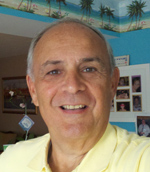 After I retired from the Navy, I was referred to Navy Together We Served by one of the shipmates I served with during my tour as Executive Officer, Personnel Support Activity Atlantic in Norfolk, Virginia. I found the NTWS website everything I wanted to keep in touch with old shipmates, continue to mentor, and share our experiences -- together. After I retired from the Navy, I was referred to Navy Together We Served by one of the shipmates I served with during my tour as Executive Officer, Personnel Support Activity Atlantic in Norfolk, Virginia. I found the NTWS website everything I wanted to keep in touch with old shipmates, continue to mentor, and share our experiences -- together.
A couple of years ago, I was asked if I would consider being Chief Admin for this exclusive website. Clearly it has been an honor to welcome new subscribers, chat with so many members, and interact with brothers and sisters in the various forums. It helps me reinforce the bonds that we all have acquired throughout the years -- together!
|
|
|
Share this Voices on:


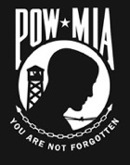

|
|
TWS VOICES
TWS Voices are the personal stories of men and women who served in the US Military and convey how serving their Country has made a positive impact on their lives. If you would like to participate in a future edition of Voices, or know someone who might be interested, please contact TWS Voices HERE.
This edition of Navy Voices was supported by:
Navy.Togetherweserved.com
For current and former serving Members of the United States Navy, TogetherWeServed is a unique, feature-rich resource enabling Naval personnel to re-connect with lost Shipmates, share memories and tell their Navy story.
To join Navy.Togetherweserved.com, please click HERE.
| |